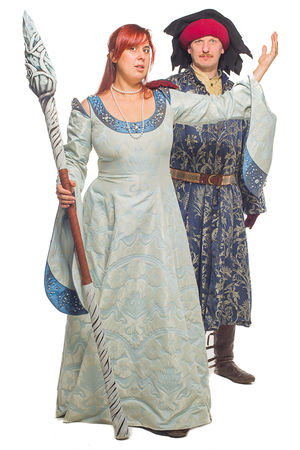Dawn magical traditions
Those who study magic are called witches in Dawn. Witches can be men or women, and cover two traditions. War witches are magicians who master useful incantations and take the battlefield. Those that are part of a noble house are expected to fight with the rest of the household. War witches train alongside a house's warriors, using their magical skills to deliver aid at the most pivotal moments of battle. Some are skilled with weapons, but all are drilled so that they can keep their wits in the thick of battle, and skilled war witches are highly prized by their house.
Of all the nations of the Empire, Dawn seems to be the most closely affected by the magic of the Eternals. Heralds, the faithful servants of the Eternals, are a much more common sight here than anywhere else, and Dawn legends are replete with personal encounters between nobles and powerful Eternals. What is clear is that for better or worse, some Eternals take a particular interest in the Dawn people, particularly in the nobility.
Weavers
Those who emphasize the study of ritual magic are usually referred to as witch weavers. They are named for their habit of focusing on weaving as part of their magic, but the term is used for anyone who uses ritual magic in Dawn. The glorious and forthright nature of Dawn means that they can be a little skeptical of the more group-oriented practice of ritual magic. Many noble magicians compensate for this by striving to be a powerful war witch as well, the two traditions being by no means exclusive.
While it is uncommon for a noble house to include an entire team of witch weavers, it is very rare for houses to be formed only of weavers, none of whom have any experience as war witches. More common are the weaver cabals, groups of witch weavers drawn from all elements of Dawnish society, who stand outside the direct control of the noble houses.
The first weaving cabals began as a place for noble magicians to trade skills and cultivate magical and crafting techniques, but eventually they found it more effective to leave their houses to work magic together. Over time the cabals became independent of the Dawn houses, choosing their own heads and even adopting their own children. As the cabals cannot set Tests of Mettle, they include yeomen amongst their numbers. It is not uncommon for a noble to forsake their noble house when they join a weaving cabal, as a form of self-imposed exile or retirement.
Much of their time is spent weaving cloth, embroidering banners and engaging in similar arts. As well as being beautiful and practical works of art, the items the weaver cabals produce tend to have protective charms woven into them. Some cabals now practice other forms of ritual magic but Summer magic remains closely tied up to the making and embroidering of cloth. A properly witch-woven banner from Dawn is the envy of every military unit in the empire.
Many weaver cabals perform magics to bring good fortune to villages, fertile harvests and good weather. As a result they tend to be more popular with Dawnish yeomen than the war witches prized by the noble houses. The popularity of the weaver cabals has translated into considerable political clout. As a result few noble houses will refuse a request by a noble witch to study with a weaver's cabal even if they harbour a fear that the student may not return to their house.
Although secretive, and rarely acknowledged, some weavers specialize in curses. Several famous tales (including the song Weaver's Curse speak of knights who jilted their magical lovers, only to find their enchanted banner a curse that ensured their inglorious defeat.
Enchanters
The apogee of magical power in Dawn is the tradition of the Enchanter, a witch who becomes Earl of a house. Wielding both the magic of incantation and ritual, enchanters are viewed as mystical powerhouses regardless of their actual abilities, not least because they often have the resources of their entire house at their command. Many make pacts with the Eternals to further enhance their arcane powers, and deal with Eternals on a more-or-less equal footing, backing up their magical might with political clout. Enchanters have played a key role in the history of the Dawn, and in stories are often portrayed as patrons and paramours of famous knights.
